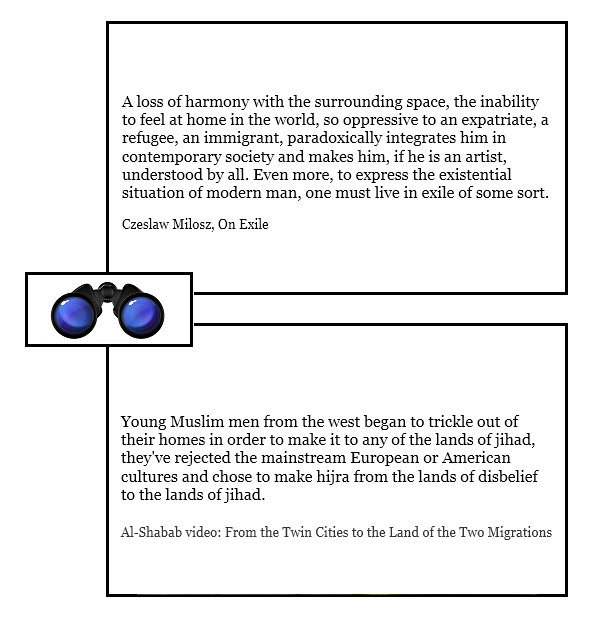[ by Charles Cameron — the lure of exile, of hijra, in the context of western jihadists going abroad ]
.
Whereas the Prophet’s first visionary reception of the Quran dates to 609-610 CE, and the Prophet himself was born some 40 years earlier, the Islamic reckoning of time (AH, Anno Hegirae) begins with his hijra or migration from Mecca, his home, to Medina — an event of huge Islamic consequence, with echoes in our own times.
One of the questions I have been pondering recently has to do with those echoes. I have been asking myself how strong a part in the decisions of westerners to migrate to Syria and elsewhere to participate in jihad might be played by the concept of hijra – either in the minds of recruits, or in the rhetoric of recruiters.
When I came across the quote from Czeslaw Milosz (above, upper panel), I recognized that I had stumbled upon the expression of a secular equivalent of that yearning — and thus perhaps an opening into our own deeper understanding of hijra (lower panel) — a sacralization and hence an intensification of the same yearning.
**
It is therefore instructive to note conversely that Thomas Hegghammer, in his paper Should I Stay or Should I Go? Explaining Variation in Western Jihadists’ Choice between Domestic and Foreign Fighting, p 7, quotes Anwar al-Awlaki as advising a correspondent:
[Hearing] that you intend on making hijrah [emigration], I immediately wanted to contact you to tell you that my advice to you was to remainin your current position.
Here, strategic rationalism attempts to prevail over romantic yearning…
**
Sources:
Czeslaw Milosz, On Exile, quoted in Paris Review Al-Shabab video: The Path to Paradise: from the Twin Cities to the Land of the Two Migrations, at 08.23-08.36



